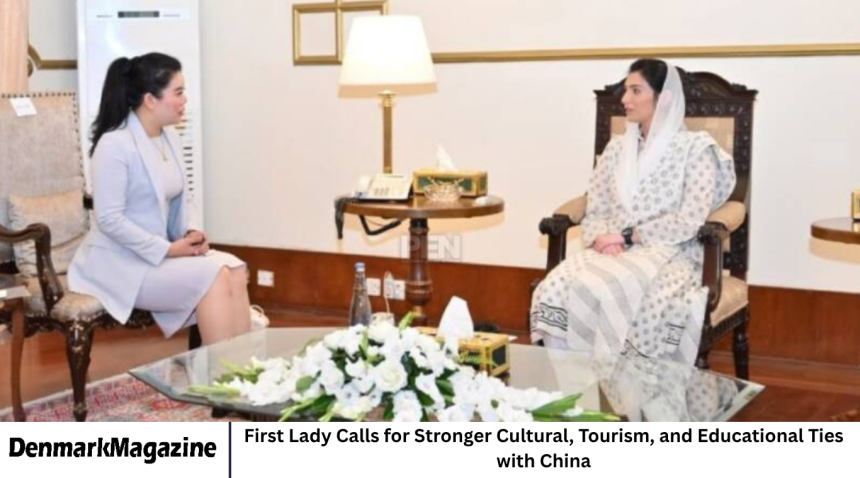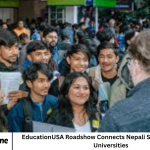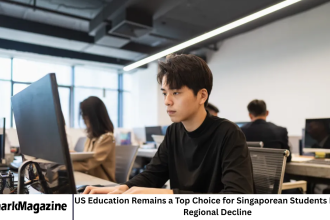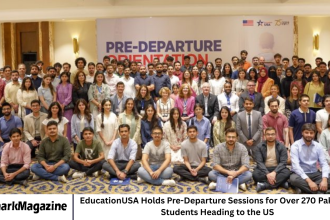The First Lady has called for deeper cooperation between Pakistan and China in the areas of culture, tourism, and education, highlighting the need to strengthen people-to-people connections between the two nations. Her remarks came during a meeting with Chinese cultural representatives and education officials, where she emphasized that mutual understanding and exchange are the cornerstones of a lasting friendship.
The First Lady’s statement reflects Pakistan’s ongoing commitment to further enhance ties with China beyond economic and strategic cooperation. She stressed that cultural collaboration, educational exchange, and tourism development play a vital role in deepening bilateral relations and fostering goodwill among the people of both countries.
Promoting Cultural Cooperation
During the meeting, the First Lady underscored the importance of cultural diplomacy as a means to bring people closer together. She noted that Pakistan and China share a deep historical connection and that their cultural heritages complement each other in many ways. Both countries have rich traditions in art, music, literature, and crafts that can serve as powerful tools to build mutual appreciation and respect.
She proposed more frequent cultural exhibitions, film festivals, and art exchange programs to help showcase the creativity and diversity of both societies. By encouraging cultural collaborations between artists, writers, and performers, the First Lady believes that the two nations can develop a stronger emotional bond.
Cultural initiatives such as the Pakistan-China Cultural Corridor and joint heritage preservation projects were also discussed as avenues to expand cooperation. The First Lady expressed her hope that more Chinese tourists and artists would visit Pakistan to experience its hospitality, ancient architecture, and vibrant traditions firsthand.
Strengthening Tourism Links
Tourism was another major area of focus during the meeting. The First Lady highlighted Pakistan’s vast potential as a tourist destination, offering breathtaking landscapes, historical monuments, and a unique blend of cultures. She encouraged efforts to promote Pakistan as an attractive destination for Chinese tourists, particularly through joint marketing campaigns and partnerships between tourism boards.
She also pointed out that tourism can serve as a bridge for cultural exchange, as travelers experience each other’s customs, cuisines, and ways of life. This not only strengthens understanding but also contributes to the local economy and community development.
The First Lady emphasized that improving infrastructure, ensuring safety, and enhancing travel facilities could make Pakistan more accessible and appealing to international visitors, including those from China. She also encouraged the private sector to participate in tourism promotion by investing in hospitality, eco-tourism, and travel technology initiatives.
Expanding Educational Collaboration
Education was described as one of the most powerful tools for long-term cooperation between Pakistan and China. The First Lady praised the growing number of exchange programs and scholarships that have allowed thousands of Pakistani students to study in Chinese universities. These students, she said, return home with valuable skills, language proficiency, and a deeper appreciation for Chinese culture.
She called for expanding these opportunities by creating more joint research programs, university partnerships, and student exchange initiatives. The establishment of Chinese language centers and Confucius Institutes in Pakistan has already made a significant impact, helping young people learn Mandarin and understand Chinese society better.
Similarly, she suggested that Pakistani universities could introduce more courses on Chinese history, literature, and technology, while Chinese institutions could expand programs related to South Asian studies. These educational collaborations, she said, not only enhance academic growth but also promote long-term friendship and mutual respect between future generations.
The Role of Women and Youth in Bilateral Relations
The First Lady also highlighted the vital role that women and young people play in strengthening Pakistan-China relations. She encouraged initiatives that empower women through education, entrepreneurship, and cultural exchange programs. By fostering opportunities for women to contribute to diplomacy, arts, and business, she believes both countries can create a more inclusive and balanced partnership.
Youth engagement was another key theme. The First Lady emphasized that the younger generation must be encouraged to take an active role in sustaining bilateral ties. Programs such as youth leadership forums, cultural festivals, and joint volunteer projects can help nurture lasting friendships and mutual understanding.
Building on the Pakistan-China Friendship
The First Lady described the Pakistan-China friendship as a model of regional cooperation based on trust, respect, and shared development goals. She noted that the China-Pakistan Economic Corridor (CPEC) has laid a strong foundation for collaboration, not only in infrastructure and trade but also in human development.
However, she stressed that the relationship must go beyond economic interests to include stronger social, educational, and cultural dimensions. By focusing on people-to-people connections, both nations can ensure that their partnership remains sustainable and meaningful for generations to come.
She praised China’s support for Pakistan’s development initiatives and expressed gratitude for the continued cooperation in technology, healthcare, and education. The First Lady reiterated Pakistan’s commitment to strengthening this bond by fostering cultural harmony and educational advancement.
Frequently Asked Questions
What did the First Lady emphasize during her meeting with Chinese representatives?
The First Lady highlighted the importance of strengthening cultural, tourism, and educational ties between Pakistan and China to promote mutual understanding and cooperation.
Why is cultural exchange important between Pakistan and China?
Cultural exchange helps build mutual respect and appreciation by allowing both nations to share their art, traditions, and values, thereby deepening people-to-people ties.
How can tourism enhance bilateral relations?
Tourism allows citizens from both countries to experience each other’s culture, history, and hospitality firsthand, fostering stronger connections and economic growth.
What role does education play in Pakistan-China relations?
Education serves as a foundation for long-term cooperation by promoting student exchanges, research partnerships, and language learning that strengthen bilateral understanding.
What future steps were suggested by the First Lady?
The First Lady encouraged more cultural programs, expanded educational collaborations, and initiatives that engage women and youth to sustain the strong Pakistan-China friendship.
Conclusion
The First Lady’s call for enhanced cultural, tourism, and educational ties with China reflects a vision for a more interconnected and cooperative future. Her message reinforces the idea that lasting relationships between nations are built not only on trade or politics but also on shared values, cultural understanding, and mutual learning.
By investing in cultural exchanges, promoting tourism, and expanding educational opportunities, Pakistan and China can continue to deepen their historic friendship. These efforts will not only strengthen diplomatic relations but also create lasting connections between their people — ensuring that the Pakistan-China partnership remains vibrant, inclusive, and forward-looking in the years ahead.









